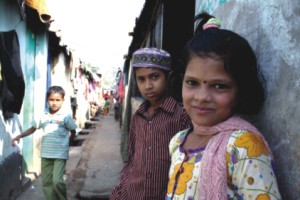|
Newsnotes
The Right to Citizenship
Finally, a decision has been taken on the camp-based Urdu speaking communities who have been living like refugees for decades in many parts of Bangladesh. Last week, the High Court (HC) declared about three lakh Biharis living in different parts of the country as citizens of Bangladesh. Responding to a writ petition filed by 11 Urdu-speaking people, a High Court bench comprising Justices Mohammad Abdur Rashid and Ashfaqul Islam also directed the Election Commission (EC) to include the petitioners' names in the voter list.
Last year on November 26, eleven members of the Stranded Pakistanis Youth Rehabilitation Movement including its president Sadakat Khan filed the writ petition seeking HC orders to register the three-lakh Urdu-speaking people, as voters, living in 116 camps across the capital and elsewhere.
According to a publication of the Refugee and Migratory Movements Research Unit (RMMRU) of Dhaka University, these Biharis had first moved to Pakistan from India in 1947. Then 74,000 of them migrated to the former East Pakistan and the migration continued up to 1952. At least 4.26 lakh Biharis left Bangladesh during and after the Liberation War in 1971 while around 4 lakh opted to stay on. Following an agreement in 1974, Pakistan took back over 1 lakh of them. The number of Biharis repatriated so far stands at 1.61 lakh. Later, Pakistan stopped accepting applications from those willing to return and terminated the repatriation process.
For years now, the state of the Biharis had become pitiful. With generations of families comprising of more than 50-80 people in each family residing in small shacks, these people did not even have a proper identity. Not being able to return to Pakistan, nor being able to live as citizens of Bangladesh, these Biharis were unable to work properly or educate their children. Most of them would earn a living by weaving and making household items for their neighbours in the respective areas. Including these people in the voter list was the right thing to do. It is up to them to show that they are true citizens of this country.
Of Storage and Food Security
It is oddly ironic that the food advisor also happens to be the disaster management minister as this year both his portfolios could have been combined into one. In a masterly display of planning from the government this year, hundreds of tonnes of agricultural products rotted as the nation could barely feed itself. It was a case of water everywhere without a drop to drink. The food and disaster management advisor Dr AMM Shawkat Ali decided not to focus too much on the past and the millions currently in need of food when he looked to the future by announcing that the government would spend Tk 350 crore on new food godowns at the Upazilla level. He said, “The warehouses will be built under a government project which aims at increasing food stock capacity in the public sector. The prime objective of the project is to ensure food security in an emergency or any crisis.” These comments were made during his recent visit to Mymensingh and Netrakona as he tried to stir up support for his public sector cereal procurement drive. What he failed to mention was exactly how many new godowns would be built and where, and why it would take up to three years to simple godowns when the nation is suffering from a lack of proper storage space now. His statement and possibly the effort is laudable enough but yet again the government has failed to properly deal with the problem of our food security. It is a very general and sweeping statement to say that the government will spend Tk 350 crore to save us from our food related problems, but where is the plan to deal with the problems now. The godowns are needed now; surely they will be of help in three years time as well, but by then how many people would have starved? Vague promises and proposals must be replaced with concrete plans and an urgency that is yet to be seen, three years is too long, the time to act is now.
|
Copyright (R) thedailystar.net 2008
|
